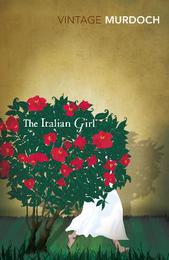
|
The Italian Girl
Paperback / softback
Main Details
| Title |
The Italian Girl
|
| Authors and Contributors |
By (author) Iris Murdoch
|
| Physical Properties |
| Format:Paperback / softback | | Pages:176 | | Dimensions(mm): Height 198,Width 129 |
|
| Category/Genre | Modern and contemporary fiction (post c 1945)
Classic fiction (pre c 1945) |
|---|
| ISBN/Barcode |
9780099285236
|
| Classifications | Dewey:823.914 |
|---|
| Audience | |
|---|
|
Publishing Details |
| Publisher |
Vintage Publishing
|
| Imprint |
Vintage Classics
|
| Publication Date |
2 November 2000 |
| Publication Country |
United Kingdom
|
Description
A witty, elegant comedy of errors to rival any of Shakespeare's Edmund has escaped from his family into a lonely life. Returning for his mother's funeral he finds himself involved in the old, awful problems, together with some new ones. One by one his relatives reveal their secrets to a reluctant Edmund- illicit affairs, hidden passions, shameful scandals. And the heart of all, there is, as always, the family's loyal servant, the Italian girl.
Author Biography
Iris Murdoch was born in Dublin in 1919. She read Classics at Somerville College, Oxford, and after working in the Treasury and abroad, was awarded a research studentship in philosophy at Newnham College, Cambridge. In 1948 she returned to Oxford as fellow and tutor at St Anne's College and later taught at the Royal College of Art. Until her death in 1999, she lived in Oxford with her husband, the academic and critic, John Bayley. She was made a Dame of the British Empire in 1987 and in the 1997 PEN Awards received the Gold Pen for Distinguished Service to Literature. Iris Murdoch made her writing debut in 1954 with Under the Net. Her twenty-six novels include the Booker prize-winning The Sea, The Sea (1978), the James Tait Black Memorial prize-winning The Black Prince (1973) and the Whitbread prize-winning The Sacred and Profane Love Machine (1974). Her philosophy includes Sartre: Romantic Rationalist (1953) and Metaphysics as a Guide to Morals (1992); other philosophical writings, including The Sovereignty of Good (1970), are collected in Existentialists and Mystics (1997).
ReviewsShe was always in the front rank of unpredictable, original, serious writers exploring the deeper themes of ancient as well as contemporary experience * Guardian * Iris Murdoch really knows how to write - she can tell a story, delineate a character, catch an atmosphere with deadly accuracy -- John Betjeman I suspect that when the intellectual map of our own times comes to be sketched out, Iris Murdoch will occupy a position analogous to Tolstoy and Dostoyevsky... Murdoch writes better than anyone about the condition of being love: both the ecstatic joys of it and its capacity to turn otherwise decent individuals into monsters of selfishness and cruelty... Her vision of the world is heart-rending, but ultimately celebratory -- A.N. Wilson
|